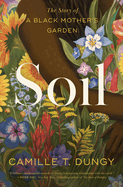
"A garden is never wasted space," writes poet and essayist Camille T. Dungy (Trophic Cascade; Guidebook to Relative Strangers) in her beautiful memoir, Soil. After many years in California, Dungy returned in 2013 to her native Colorado with her husband and daughter. She was determined not only to tend but to also nourish and diversify the land attached to their house and spent years rehabilitating the soil and introducing native plants, including an extensive pollinator garden. Battling Fort Collins's fierce winds and short growing season, as well as her white neighbors' restrictions on what she could grow, Dungy created a life-giving space, both for her family and for the local plants and animals that also call her garden home.
Dungy writes in powerful, lyrical prose about her planting triumphs and disasters; the history of gardens and public lands (which often excluded Black people) in the United States; the rabbits that inhabit her lawn; and parenting her daughter during a global pandemic. Her prose, like her garden, is full of color, detail, and sharp, unexpected life. Though Dungy beautifully zeroes in on individual plants--the hollyhocks in her dooryard, the bindweed she wrestles every year, the neighbor's cottonwood tree--she also pulls back to include a broader perspective on growth, diversity, and perseverance: "no perennial in life's garden roots more deeply than history," Dungy notes. Soil is her contribution to, and interrogation of, that history. And it comes from someone whose intersecting identities--Black woman, mother, writer, gardener--give her a singular and incisive perspective on tending the land she loves. --Katie Noah Gibson, blogger at Cakes, Tea and Dreams

